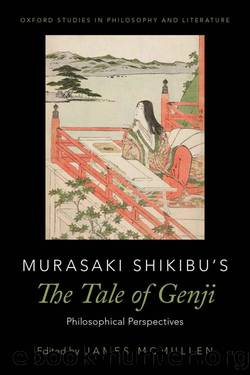Murasaki Shikibu's The Tale of Genji (Oxford Studies in Philosophy and Lit) by James McMullen

Author:James McMullen [McMullen, James]
Language: eng
Format: epub
Publisher: Oxford University Press
Published: 2019-04-30T05:00:00+00:00
Any reader will pick up on the erotic vibes here; âinsiderâ readers may do so in part through recognition of the figure of âsmoldering desireâ transferred to a burning flame of one kind or another as a time-tested waka trope (many editions, including Washburnâs, cite a particular poem in the KokinshÅ« as a touchstone). But the whole vignette is itself a replay of such dialogues-in-verse between wooing males and resisting (often dismissive, or at least very guarded) women, which are ubiquitous in monogatari, in diaries that also work in and with poems, and in âloveâ (koi)-themed sections of topically categorized and sequenced anthologies. Furthermore, Genjiâs âeternal flame of loveâ is also a doubling, two-layered affair: he refers both to his unquenched passion for Tamakazura and for her long-dead mother, YÅ«gao, and summons into this flame-lit garden the remembered traces of her smoldering funeral pyre (which he did not see with his own eyes, but heard tell of in Koremitsuâs eyewitness report). Tamakazura fires back with a prediction (and a wish) that his fickle passions may soon disperse into thin air. In short, this vignette is already overloaded and overdetermined by its intertext, which reaches back into as well as far outside the Taleâs text itselfâall with one move, one sleight of hand, abracadabra, multivalent conjuring actâbut it thereby gains in its poetic and (melo)dramatic vigor, bite, and gently parodic (or parasitic?) seriocomic stop-action momentousnessâall of which quickly passes, like the chapter itself, leaving an ash-like or vaporous, bittersweet resonance and acrid odor in its wake.
I have suggested that one might read the Tale as a housing for poems, or for poetry itself. Within that construct, furthermore, there are certain poems, and particularly fragments, or âsmoky, vaporous traces,â or ghosts of poems that are brought into its space and the readerâs sphere of attention, which then seem to refuse to leave, to resist exorcism, but rather insist upon reasserting themselves, thereby complicating and enriching the texture of the text in their particular ways, with their own lingering flavorsâsweet, bitter, acrid, always fragrant. This is especially true of certain poetic traces that are introduced into the textâs extended (fifty-four-chapter-long) orchestration through fragmentary quotation (inâyÅ). One might cite many examples: there are the recurring references to Bai Juyiâs âSong of Unending Sorrow,â beginning in the very first chapter (âKiritsuboâ) in the account of Genjiâs fatherâs grief over the boyâs motherâs devastating death, which mirrorsâas does their whole love storyâthat of the Tang Chinese emperor and his consort who are the songâs protagonists. There is also the morphed revivification, through poetic quotation and adroit rearrangement, of the theme and attendant figures of nostalgic longing associated with the scent of orange blossoms, which thoroughly imbues and around which the short but evocative Chapter 11 âHanachirusatoâ is built and that gives the woman with whom Genji falls in love in it her lasting âname,â âthe lady of the house of scattering [orange] blossoms.â But here I will dwell on what may be the most frequently recurrent
Download
This site does not store any files on its server. We only index and link to content provided by other sites. Please contact the content providers to delete copyright contents if any and email us, we'll remove relevant links or contents immediately.
4 3 2 1: A Novel by Paul Auster(12393)
The handmaid's tale by Margaret Atwood(7767)
Giovanni's Room by James Baldwin(7347)
Asking the Right Questions: A Guide to Critical Thinking by M. Neil Browne & Stuart M. Keeley(5775)
Big Magic: Creative Living Beyond Fear by Elizabeth Gilbert(5774)
Ego Is the Enemy by Ryan Holiday(5450)
The Body: A Guide for Occupants by Bill Bryson(5098)
On Writing A Memoir of the Craft by Stephen King(4944)
Ken Follett - World without end by Ken Follett(4734)
Adulting by Kelly Williams Brown(4574)
Bluets by Maggie Nelson(4559)
Eat That Frog! by Brian Tracy(4541)
Guilty Pleasures by Laurell K Hamilton(4450)
The Poetry of Pablo Neruda by Pablo Neruda(4110)
Alive: The Story of the Andes Survivors by Piers Paul Read(4033)
White Noise - A Novel by Don DeLillo(4012)
Fingerprints of the Gods by Graham Hancock(4005)
The Book of Joy by Dalai Lama(3986)
The Bookshop by Penelope Fitzgerald(3854)
